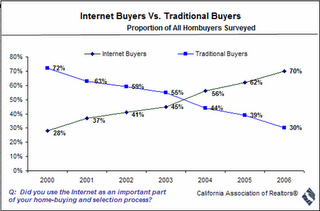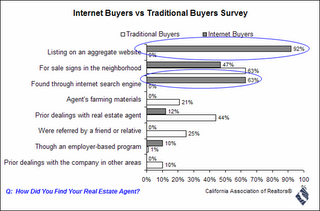Exposure - Natural Search
According to the 2006 Internet vs. Traditional Buyers Survey published by the California Association of Realtors (CAR), 9 out of 10 Internet buyers found their agent through a real estate search site. As of 2006, Internet buyers represented 71 percent of total buyers, a 10 percent increase over the previous year.
 With numbers this high, increasing online exposure should become a major goal for any real estate brokerage. This section explores four strategies successful brokerages must adopt to win in this area:
With numbers this high, increasing online exposure should become a major goal for any real estate brokerage. This section explores four strategies successful brokerages must adopt to win in this area:· Natural Search optimization;
· Vertical search optimization;
· Offline advertising; and,
· Combined online and offline branding.
 Natural search refers to optimizing online content for inclusion in traditional search engines indexes, such as Google, Yahoo, MSN Search and Ask. Vertical search on the other hand involves getting listing content submitted to real estate specific search sites. This generally involves feeding structured data to these sources, wherein natural search involves allowing content to be automatically crawled and indexed by machines.
Natural search refers to optimizing online content for inclusion in traditional search engines indexes, such as Google, Yahoo, MSN Search and Ask. Vertical search on the other hand involves getting listing content submitted to real estate specific search sites. This generally involves feeding structured data to these sources, wherein natural search involves allowing content to be automatically crawled and indexed by machines. For years, relevance has been one of the primary goals of major search engines. By most accounts, search engines such as Google have improved the relevance of their search results and their ability to programmatically identify the most appropriate documents for specific search terms. Leading local real estate brokerages are in the best position to take advantage of improvements in search, yet few do. Most brokerages lack the basic search engine optimization knowledge on their team, but more problematic is the abundance of choices of online service providers they can work with, many of whom also lack this basic knowledge.
According to the CAR survey mentioned earlier, of all Internet buyers who found their agent through a real estate search site, 60 percent started their search on an Internet search engine. But, unfortunately, many real estate brokerages have made natural search optimization a non goal. While a company’s position on a search engine is by and large not controllable, there are some fundamental strategies companies should follow to optimize their ranking. This is critical, as it directly relates to lead generation.
 63% of Internet buyers started their search on an Internet search engine
63% of Internet buyers started their search on an Internet search engine- CAR 2006 Internet vs. Traditional Home Buyers Survey
Following are three fundamental strategies real estate companies need to think about with respect to visibility through natural search.
I- Popularity - Search engines quantify a website’s popularity by measuring the number of links it has pointing to it. There are many key algorithmic factors that play into the ultimate placement of a site, but in general, the key is to have as many online articles and blogs point to your website as you possibly can. The better quality these websites and blogs are, the more beneficial and relevant their links become to the search engine. A real estate company can start a program focused on seeking links, but the best long term strategy is to incorporate the company’s URL in all offline and online marketing so anyone seeing it can easily access the site and, in the case of blogs, comment on it. The latter is especially important, given the increasing popularity of blogs.
Blogs are an entire topic to themselves, but for the purpose of this paper, I will briefly go over what they are and why they matter.
Blogs are simple websites or website sections that generally display content in reverse chronological order. Content posted by a blog author is typically open for comments by readers, usually leading to discussion about the content by interested parties. The content can be syndicated to third party blogs and websites through a feed (RSS, Atom, XML). Blogging commands time commitment because in order to be engaging and generate an audience, blog content has to be timely, relevant, and valuable to the readers it targets. The benefits however can be significant. Because of their conversational nature, blogs naturally link to each other, helping to multiply the number of links back to your website, a key part of your ‘‘popularity strategy’ with search engines. An excellent source for a more comprehensive discussion on blogs is the book Naked Conversations, by Robert Scoble and Shel Israel.
II- Content - It is critical for search engine optimization to ensure that your most valuable online content can be easily found and indexed by machines. This refers to property listings. Commonly, real estate companies have websites that display listings via a feed or link from the MLS, and place the listing content inside frames. The most important thing to remember from this section is that content in framesets can not be readily seen and indexed by search engine crawlers. Some framesets launch a listing search in a new window with JavaScript, and some hide the majority of listing content behind a registration. These implementations prevent listing content from being properly crawled.
Let’s consider the example of a brokerage that has over 100 property listings. Each listing represents a minimum of one page of valuable content. Since a website’s position in search engines is enhanced by increasing the amount of content it offers, you can effectively leverage each of your listings by giving each its own web address (URL). And to maximize the value of that page to search engine crawlers, that URL should be descriptive.
III- Web Page Description - The third major strategy for search engine optimization is to accurately describe online documents (pages). Real estate is a local business. Therefore, terms consumer use to search for real estate include local information, such as the general location and neighborhood name. Of course, descriptions need to consider listing types, styles and features. As such, online documents or web pages must accurately describe the content on the page, both in the title and meta information. But they also need to describe the content using commonly used search terms and phrases. Doing both will maximize traffic from common searches as well as from the long tail of search. More on that in a moment.
While identifying popular search terms to apply to your listing descriptions on your site, it is important to be deeply descriptive in order to take advantage of the long tail of search.
The long tail refers to deeper or narrower searches conducted by consumers using search engines to find what they are looking for. As search engines have improved at returning relevant content, many people have become more efficient at using them and are conducting more exact searches to help find exactly what they are looking for, faster.
For comparison, following are some examples of Broad Search and Exact Search terms.
Broad Search:
- San Francisco real estate
- San Francisco homes for sale
- Denver real estate
- Denver homes for sale
Exact Search (typically considered the long tail):
- Nob Hill San Francisco homes for sale
- Homes for sale in Nob Hill San Francisco
- Lakeview Denver homes for sale
- Condos for sale in Lakeview Denver, Colorado
It is important to realize that the long tail of search (Exact Search) has today become extremely relevant, as more consumers are now refining their real estate search queries down to the neighborhood name level, rather than by larger city names. Recent analysis conducted by Point2 Technologies using Google Analytics, on traffic generated to the company’s real estate portal www.Point2Homes.com, showed that some of the busiest market centers are getting anywhere from 15 to 40 percent of their direct traffic from narrow neighborhood searches, such as the examples listed above. Below is a chart of direct traffic to a content section on http://www.point2homes.com/. Over the specified time period that covered a total of 420 searches, 126 or 30 percent of the keyword searches were local neighborhood level search, or, search from the long tail.
 If all this sounds like a lot of work, it is. But solutions such as Point2 Agent, Point2 Broker and Point2 Builder are designed to address these requirements, automatically optimizing listings pages for major search engines. The real estate professional needs to merely input listing data on simple web forms, and select structured feature sets. In other words, simply enter your listings and allow the underlying technology to manage search engine optimization for you. Further, the Point2 system gives each listing its own optimized URL, so it can be more easily crawled and indexed by search engines.
Share
If all this sounds like a lot of work, it is. But solutions such as Point2 Agent, Point2 Broker and Point2 Builder are designed to address these requirements, automatically optimizing listings pages for major search engines. The real estate professional needs to merely input listing data on simple web forms, and select structured feature sets. In other words, simply enter your listings and allow the underlying technology to manage search engine optimization for you. Further, the Point2 system gives each listing its own optimized URL, so it can be more easily crawled and indexed by search engines.
Share

No comments:
Post a Comment